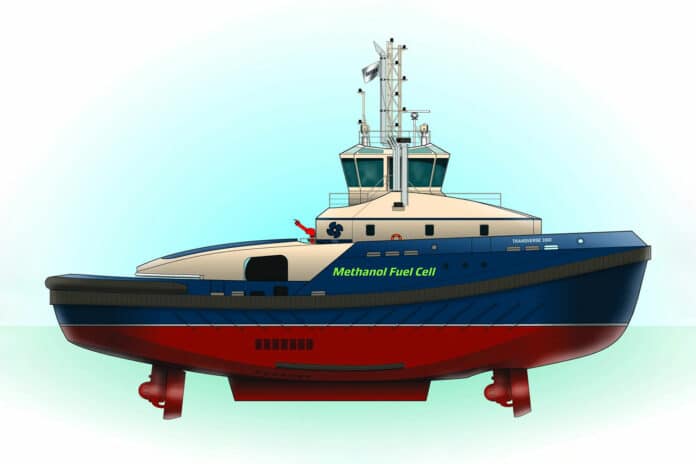Several tugboat designs around the world are gearing up for unprecedented, green towage operations. Most of these designs incorporate battery-electric propulsion technology, while a few are bold enough to try something even more innovative.
Svitzer, a company delivering safe, reliable, and cost-efficient towage and marine solution services since 1833, is working on what they claim to be the world’s first methanol hybrid fuel cell (MHFC) tug – a hybrid tugboat combining methanol fuel cells with battery power.
The company has conducted technical studies to establish the feasibility of this type of vessel accommodating the real-world operational requirements of a tug.
Now, Svitzer and naval architect company Robert Allan will work together to design the MHFC tug. The next phase will include work to complete the vessel design, scope considerations for vessel construction, and onboard equipment selection necessary to build the vessel.
The MHFC tug will use an electrical propulsion system with methanol fuel cells and batteries. This will enable a self-sustained tug with longer endurance and fewer operational constraints than a purely battery-powered vessel. Secondary methanol-fueled generators will provide backup power if required without the need for a secondary fuel.
Svitzer claims that the MHFC tug running on green methanol would prevent approximately 1,300 tonnes of CO2 annually from being emitted into the atmosphere, compared to fossil-fuel-based vessels of the same dimensions within Svitzer’s global fleet.
“This project is a major milestone in Svitzer’s commitment to the decarbonization of our global fleet and demonstrates our ability to harness new technologies and alternative fuels to deliver innovations that will have a significant, positive impact on shipping’s road to net zero,” said Gareth Prowse, Head of Decarbonisation at Svitzer, in a statement.
“The combination of fuel cell technology and green methanol will result in improved operational efficiencies, resulting in less fuel consumption and lower emissions. We’re delighted to be collaborating with Robert Allan Ltd. to design the MHFC tug and look forward to bringing on new partners to construct the vessel, which will operate at the Port of Gothenburg in Sweden.”
The MHFC is expected to enter operations in the second half of 2025 at the Port of Gothenburg in Sweden, where methanol is the low-carbon alternative fuel of choice. The Port of Gothenburg has set ambitious targets to reduce shipping emissions within the port area by 70% by the end of this decade.
